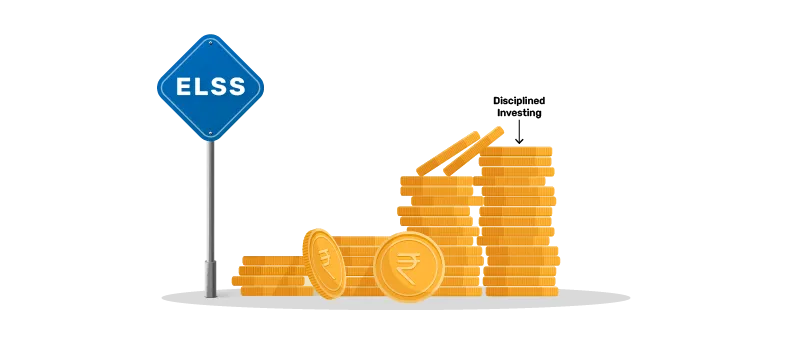Equity-Linked Saving Scheme (ELSS) is a unique investment option that aims for potential wealth creation while also offering tax benefits under the provisions of Section 80C of the Income Tax Act, 1961. ELSS primarily invests the major corpus of money (minimum 80% of the portfolio) in equities and equity-related securities.
There is no minimum allocation required in each market capitalization, so the fund manager is free to plan the flexi cap fund investment portfolio as per their growth strategy, market knowledge and insights.
Furthermore, these funds have the shortest lock-in period among all tax-saving investment options. The mandatory lock-in period for ELSS is just three years.
In recent years, many salaried investors have opted for ELSS funds for tax benefits. After the lock-in period is over, the units can be redeemed or switched, or you can also continue your investments for long term wealth creation.
Investments in ELSS funds are eligible for a tax deduction of up to Rs. 1.5 lakh under Section 80C of the Income Tax Act. So basically, the amount you invest in ELSS can be subtracted from your total taxable income, thereby reducing your tax liability.
Bajaj Finserv ELSS Tax Saver Fund - Regular & Direct Plans
You can invest in the Bajaj Finserv ELSS Tax Saver Fund through two plans:
- Direct Plan: Here, you choose to invest on your own without the help of a mutual fund distributor. Since there’s no intermediary, you pay a lower expense ratio as there are no commission costs involved.
- Regular Plan: Here, you invest in the fund of your choice through a distributor who guides you through the process. However, as you involve a distributor, there is a commission fee involved. This makes the expense ratio higher than in the direct plan.
How to invest in Bajaj Finserv ELSS Tax Saver Fund
To invest in Bajaj Finserv ELSS Tax Saver Fund, you can choose between two different approaches.
- Offline mode: In this mode, you fill out an application form and submit it to your distributor or an AMC of your choice.
- Online mode: In this mode, you invest directly with your Demat account. Another way to invest is through the Bajaj Finserv AMC website. Here, you can create an online account and select the Bajaj Finserv ELSS Tax Saver Fund to invest through SIP or lumpsum. invest now.
Taxation on Bajaj Finserv ELSS Tax Saver Fund
As Bajaj Finserv ELSS Tax Saver Fund is an equity mutual fund, it follows the tax rules that apply to all equity-oriented schemes. The tax you pay depends on how long you have stayed invested.
- Short-term capital gains (STCG):
If you redeem your units within a year of purchase, any gains are classified as short-term and taxed at 20%, along with applicable surcharge and cess.
- Lon-term capital gains (STCG):
If you redeem units after a tear or more, your gains are considered long-term. In this scenario, gains up to Rs. 1.25 lakh in a financial year are exempt from taxation. Any gains above this limit are taxed at 12.5%, along with applicable surcharge and cess.
